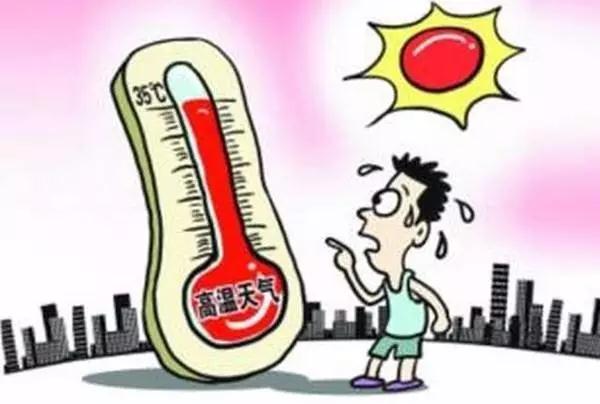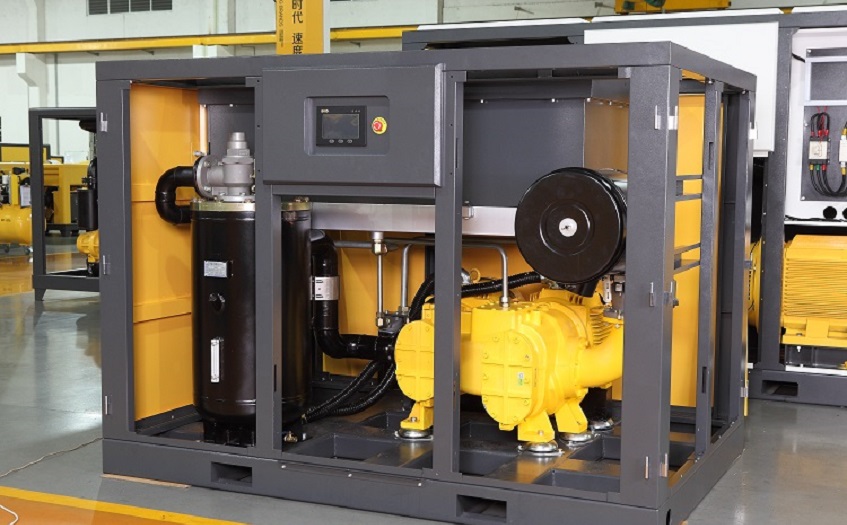Винтовые воздушные компрессоры are built to perform under pressure—but when temperatures soar, overheating and shutdowns can become a serious problem. While environmental temperature may not directly cause a shutdown, it’s often the trigger that reveals underlying mechanical or maintenance issues.
In this guide, we offer a complete set of practical strategies to help you prevent high-temperature faults and keep your screw compressor running cool and efficient—even under extreme conditions.

🌡️ Common Causes of Screw Compressor Overheating
✅ 1. Environmental Factors
- Air becomes thinner at high ambient temperatures, reducing intake density and efficiency. This means your compressor stays in load mode longer, generating more heat.
- Most compressors are designed for ambient temperatures between 30–40°C. Exceeding this range can cause the internal temperature to approach or exceed the shutdown threshold (typically 100–110°C).
📌 Ensure proper ventilation, install exhaust fans, and avoid direct sun exposure.
⚠️ 2. Mechanical Failures That Cause Overheating
• Oil Stop Valve Malfunction
Failure in the oil stop valve (also called oil shut-off valve) leads to oil starvation, causing the airend to overheat—and in severe cases, even airend burnout.
• Oil Filter Blockage
A clogged oil filter restricts oil flow, reducing lubrication and cooling capacity.
• Thermal Valve (Thermostatic Valve) Failure
If the thermal valve fails, hot oil bypasses the cooler, leading to uncontrolled oil temperatures.
• Oil Flow Regulator Issues
Incorrect spray oil volume due to regulator malfunction can increase the temperature.
⚠️ This component is pre-calibrated at the factory—adjustments must be made by professionals only.
• Oil Cooler Failure
For water-cooled compressors, check if the inlet/outlet temperature difference is under 5°C—this signals poor heat exchange. Likely causes: clogged or scaled coolers.
For air-cooled units, confirm fan operation and ambient temperature conditions.
• Airend Wear or Damage
Excessive wear in the compressor airend due to poor lubrication can generate excess heat.
• Air Filter Clogging
A dirty air filter reduces intake air volume, forcing the unit into longer load cycles and producing more heat.
• Oil-Air Separator Blockage
Blockage causes internal pressure buildup, leading to higher temperatures. Root causes may include:
a) Separator nearing end of life
b) Low oil quality or poor air separation ability
• Sensor or Controller Faults
Faulty temperature sensors or PLC errors can cause incorrect readings and premature shutdowns.

🛢️ Oil-Related Factors That Lead to High Temperatures
✅ 1. Low Oil Level
When oil level drops below minimum level mark, heat cannot be dissipated efficiently.
→ Immediate shutdown and refill required.
✅ 2. Oil Degradation or Oxidation
Old or poor-quality oil becomes thick, loses flowability, and can’t absorb or carry heat away.
→ Replace oil immediately if discolored or overused.
✅ 3. Incorrect Oil Viscosity
- Too low: poor lubrication → increased wear and friction
- Too high: poor flowability → insufficient cooling
Choose oil viscosity based on the operation manual and actual conditions (e.g., temperature range).
✅ 4. Низкокачественное компрессорное масло
Avoid oils with:
- Poor thermal oxidation resistance (leads to varnish, sludge)
- Weak air release and anti-foam properties
- Inadequate water separation ability

🏭 How to Create a “Cool Zone” for Your Screw Compressor
✅ 1. Compressor Room Layout & Design
Plan the layout of your compressor station:
- Leave enough space between compressor, dryer, tank, and filters
- Ensure airflow and exhaust paths are unobstructed
- Install ventilation fans or louvers for hot climates
- If outdoors, apply dustproofing, waterproofing, and sun protection
Also, reserve adequate maintenance space for the largest machine in the station.
✅ 2. Regular Maintenance & Inspection
- Log inspection and service records
- Replace oil, air filters, separators, and other wear parts on schedule
- Clean exterior fins and check cooling fan function
- Monitor voltage and current stability
🧪 Choosing the Right Compressor Oil: A Game-Changer
1. Viscosity & Viscosity-Temperature Performance
Adapt oil viscosity to your compressor’s working temperature and ambient conditions.
2. Thermal Oxidation Stability
Oils with better oxidation resistance reduce varnish/sludge formation and protect metal surfaces.
3. Air Release and Foam Resistance
Poor air separation leads to inefficient oil/air separation and increased oil carryover.
4. Water Resistance
In humid or coastal areas, choose oil with strong anti-emulsification properties.
5. Oil Analysis & Monitoring
If possible, perform regular oil testing to detect early signs of degradation or contamination.
✅ Final Thoughts: Keep It Cool, Keep It Running
High temperature faults in screw air compressors are preventable. With a combination of:
- Proper environment control
- Reliable mechanical components
- Correct lubricant use
- Scheduled maintenance
You can significantly reduce the risk of shutdowns and extend compressor lifespan.
На сайте Baldor, we provide advanced cooling solutions, genuine spare parts, and expert maintenance support to help you optimize performance.